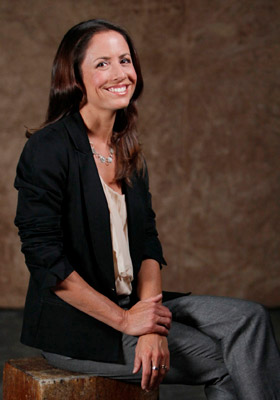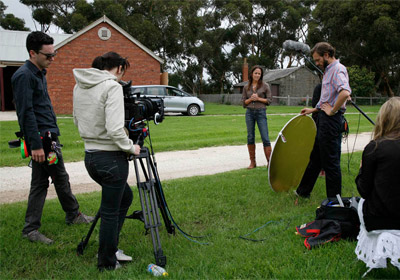Clare Wright M.A.D.E By Women: How Women Do-Mocracy Interview

Clare Wright M.A.D.E By Women: How Women Do-Mocracy Interview
Twenty powerful women speakers from across the country will descend on Australia's newest museum on May 11-12 for the inaugural M.A.D.E By Women: How Women Do-Mocracy event.
The Museum of Australian Democracy at Eureka (M.A.D.E) in Ballarat aims to inspire broader and deeper conversations about democracy. It wants M.A.D.E by Women to become an annual event that highlights the role of women in building our nation.
The weekend highlights the many, often forgotten, ways that women support the communities that underpin healthy democracies – be they helping a neighbour or being elected to Parliament.
M.A.D.E By Women has a thought-provoking group of 20 women speakers, a live performance by the Victorian Women's Trust and a screening of the ABC documentary, Utopia Girls, about how women secured the right to vote.
It will also feature a -Women in Politics' panel discussion between local, state and federal government representatives at 2pm on both Saturday and Sunday.
However, alongside formal politics, the weekend will explore the informal ways in which women -do-mocracy' through philanthropy, education, activism, the arts, social enterprise and the media.
On this Mothers' Day weekend there will also be a photographic display on the -Women's Walk' that showcases the activities of Ballarat community and business groups.
M.A.D.E By Women speakers include:
Tanya Hosch – Indigenous leader and Deputy Campaign Director, Recognise
Jan Owen – CEO, Foundation for Young Australians
Mary Delahunty – CEO Writing Australia, Walkley award-winning journalist and former Victorian Government Minister
Susie O'Brien, Herald-Sun columnist and journalist
Dr Clare Wright – Commentator and historian whose work ensures the historic contributions of many women are not forgotten
Mary Crooks – CEO of the Victorian Women's Trust
Kristin Phillips – Renowned textile conservator who led the 2010 restoration of the Eureka Flag (the centerpiece attraction at M.A.D.E)
Senator Bridget McKenzie – Nationals Senator for Victoria
Cr Samantha McIntosh – Deputy Mayor of Ballarat
All speaker sessions are free of charge, but bookings are essential. Go to www.made.org
M.A.D.E is Australia's newest museum, opening on 4th of May. It explores what democracy can mean to each of us. It gives visitors a highly sensory experience by combining historic artefacts and high-tech displays to bring the past into the present.
M.A.D.E is built on the site of the Eureka Stockade in Ballarat. It celebrates and emphasises the significance of the 1854 Stockade when miners took a stand for their democratic rights. M.A.D.E puts Eureka, which has been hailed as the birthplace of Australian democracy, into a contemporary and global democratic context.
M.A.D.E houses the Ballarat Reform League Charter and iconic Flag of the Southern Cross (Eureka Flag). The flag is generously on loan from the Art Gallery of Ballarat.
Interview with Dr. Clare Wright
Dr. Clare Wright is an award-winning historian, author and public commentator who has worked in politics, academia and the media. Clare's expertise in Australian history covers the gold rush period, 19th and 20th century women's history, democracy movements, mining history, bushrangers and the liquor industry. In 2005, The Age newspaper named her as one of Australia's top 20 public intellectuals. Clare researched, wrote and presented the one-hour ABC television documentary Utopia Girls about how women got the vote in Australia.
Question: Why did you decide to participate in M.A.D.E By Women: How Women Do-Mocracy?
Dr. Clare Wright: I've been involved as a consultant in the M.A.D.E By Women project for five years now and I have been consulting on almost every aspect of the content of M.A.D.E By Women from the beginning. I felt that M.A.D.E By Women: How Women Do-Mocracy was a brilliant opportunity to be able to bring the fruits of my academic research into the public domain. I have been working on a research project about women's role in the Eureka Stockade since 2004, it was my postdoctoral research and a federally funded project through the Australian Research Council. It was the first time that someone has gone back to the primary sources and looked in detail at the way women have been involved in the whole incident in Ballarat over that particular year. I had a fantastic opportunity to be able to see that research base through into the curating of the content of M.A.D.E.
I also have a particular interest and expertise in Australian women's history particularly the history of women's political activism in Australia. This was an opportunity to bring those research interests into the broader idea of democracy, beyond Eureka and be able to say what women have brought to democracy and to the practice of democracy in Australia.
Question: Why are events, like this essential for Australians?
Dr. Clare Wright: Coming to this weekend there is nowhere else I'd rather be than front and centre, speaking to the visitors who come to M.A.D.E and be able to talk about that journey to an extent and bring that information into the public domain in a way that is incredibly interactive, stimulating and brings a whole new dimension to the Eureka story and Australian political history in this fantastic new museum.
Question: Can you tell us about Utopia Girls, which is screening at M.A.D.E By Women?
Dr. Clare Wright: I have research interest in the way that women have engaged in the political forum, historically. Last year, I made the documentary Utopia Girls which screened on the ABC and it's about how in Australia we were the first in the world to win full political equality.
 Question: What inspired you to create the documentary, Utopia Girls?
Question: What inspired you to create the documentary, Utopia Girls? Dr. Clare Wright: I have a broader interest in the way women engage in the political forum and the way that women have struggled and strived to change the world and their own lives. I think it is really important to bring it into the public conversation because we so often still have an idea that politics is done by men and it is outside of our own lives in a rarefied structure, particularly in our idea of history. Many of us have the idea that women are involved in politics now and that's a very recent phenomenon however my argument is that it's not, women have always been engaged in politics and it's only recently that they've been allowed into the formal structures of the way that we do politics. There are so many ways of actively and politically engaging and women have always done that and in particular women in Australia as far back as the Eureka Stockade. I have a book which is to be released in October, 2013 which is the result of my research.
In particular I think it's really important for young women to have historical role models and be able to say that's how these things happen and that nothing changes unless you make it change and these women have been there in the past to make things change. If we don't bring them out into the public eye they have been buried by history.
Question: Was there a group of people who you specifically hoped would view Utopia Girls and attend M.A.D.E By Women: How Women Do-Mocracy?
Dr. Clare Wright: What M.A.D.E does is show the way women have been engaged and my research has been able to see some of the women who were there in Ballarat but also more broadly speaking of the women's suffrage movement and acknowledges the role that women have played in Australia's political history and activism and democracy movements in a way that I think will be inspiring to young people generally and young women also.
Question: Can you talk us through the process of creating Utopia Girls?
Dr. Clare Wright: It was a very long process that took about six years to make. The process involved taking the idea to the ABC then perusing that and chasing it down as this is a very important story to tell. For me it's a story about recognising that in my life as a 44 year old working wife with three children, I have never had any sense that there is anything that I can't do and my education, family life and culture has always encouraged the view that women these days can do anything they like. But, as a Historian I also know just how recent of phenomenon that is and I wanted to understand how it was that as a modern women today, I could live the life that I wanted to live and how so recently, 100 years ago, women didn't even have the right to vote and had didn't have basic citizenship rights and how that could change so quickly.
It was a process of going back and rediscovering that history, rediscovering the women who made that possible and putting a name, story and face to them so that women today don't get the sense that it just happened. We take these rights for granted but we are living out the legacy of other women's hard work. I wanted to tell the story of who those women were and what the conditions of their lives were that made them want to strive to change that so much. I wanted to put us right back in that time and try to understand what it was like to be a woman 150 years ago or even 100 years ago.
Question: Tell us about your upcoming book, The Forgotten Rebels of Eureka:
Dr. Clare Wright: The book shows that women were absolutely integral to what was going on in Ballarat in 1854 that lead up to the clash at the Stockade in December. The Forgotten Rebels of Eureka is the result of ten years of meticulous research and it tells, for the first time, the story of women's involvement in the Eureka Stockade.
Interview by Brooke Hunter
MORE
- Katrina Allen Miss De Jour Interview
- 2012 DHL Express Fashion Export Scholarship
- Kelly Thompson Interview
- Taryn Williams Wink Model Agency
- Bernadette Black Brave Foundation
- Lisa Donath Just BU
- Mark McCrindle Grace Removals
- Meg Lanning Cricket Australia The Southern Stars
- Emily Rodda Get Reading Interview
- Dr Helen Szoke BackMeUp Campaign
- Dr. Peter Welburn Launch of LEO Pharma Australia
- Denise Roberts Screenwise
- Helen Kalafatic Producer
- Fay Staios The Angliss Spa Interview
- Charles Darwin University Practice Suite
- Kara Knudsen Target 100 Interview
- First Porsche Carrera Cup Female
- Furniture Workshops Renew Social Fabric
- Electrolux Appetite for Excellence Awards 2012
- Clare Wright M.A.D.E By Women: How Women...





